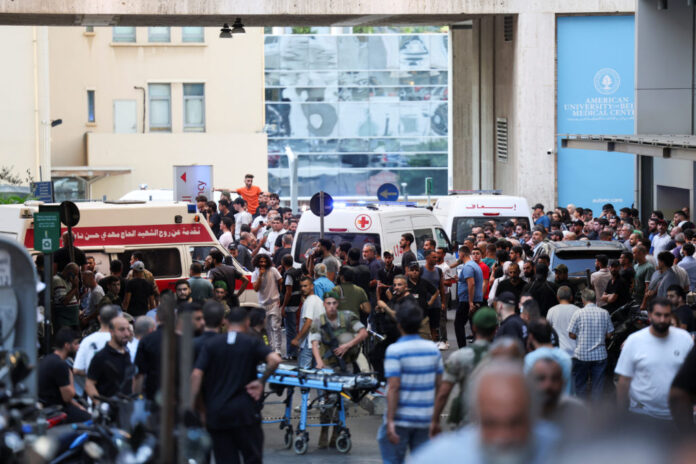A series of explosions targeting thousands of handheld pagers used by Hezbollah has left at least 12 dead and over 3,000 injured in a coordinated attack that has been attributed to Israel’s spy agency Mossad. The blasts, which rocked Hezbollah’s communication networks on Tuesday, have ignited widespread speculation about the methods employed to carry out this unprecedented sabotage.
Analysts and security experts suggest that the operation reflects a deep infiltration into Hezbollah’s supply chain, with some asserting that the devices were tampered with prior to reaching the group. The explosions, described by fire investigation expert Jerry Back as “a planned IED event,” reportedly involved the use of Pentaerythritol Tetranitrate (PETN), a highly potent plastic explosive commonly utilized in military operations.
“The simultaneous detonation of thousands of pagers indicates a highly coordinated effort,” said Jon Alterman, director of the Center for Strategic Studies’ Middle East programme. According to reports, small amounts of PETN were hidden within the batteries of the pagers, which could be detonated remotely by raising their temperature. Witnesses noted that some Hezbollah members noticed their pagers heating up before the explosions, prompting them to discard the devices, potentially mitigating the casualty count.
A source close to Hezbollah revealed that the pagers involved were part of a recent shipment imported by the group, raising concerns about how the devices were rigged and when explosives were planted. Mossad is suspected to have intercepted the shipment during transit, possibly inserting the PETN explosives before the pagers reached Hezbollah.
The pagers in question were initially reported to have been manufactured by Taiwanese company Gold Apollo, but the company has since denied any involvement. “They are not our products from beginning to end,” said Gold Apollo head Hsu Chin-kuang in response to media reports. This denial leaves open questions about the origin of the pagers and how the operation was executed.
Hezbollah has promised retaliation against Israel for what it called “the biggest security breach” since the start of the ongoing Gaza conflict. The attack also seriously injured Mojtaba Amani, Iran’s ambassador to Lebanon, who was taken to Tehran for treatment. Ali Ammar, the son of a Hezbollah parliament member, was among those killed in the explosions.
While Israeli officials have declined to comment on the incident, Hezbollah has vowed revenge. In a statement, the group said, “the resistance will continue today, like any other day, its operations to support Gaza… while the criminal enemy should await the harsh punishment in response to Tuesday’s massacre.”
As investigations continue, the attack highlights Israel’s significant intelligence capabilities and its potential reach into Hezbollah’s logistics network, sparking concern about future vulnerabilities within the group’s ranks.



